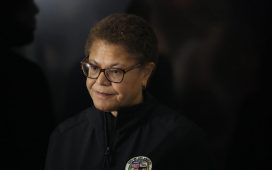Used car sales are soaring all over the U.S., and companies from Autonation to CarMax, Carvana and Buffalo, New York-based used car start-up ACV Auctions are benefitting.
Patrick T. Fallon | Bloomberg | Getty Images
For at least a few weeks during the worst of the Covid-19 shutdowns, ACV Auctions faced a challenge no start-up can be sure it can overcome: all of its core customers no longer allowed to be in business. As car dealerships across the U.S. were put under lockdowns, the Buffalo, New York-based used car market technology company was in a situation its CEO George Chamoun describes as “sort of scary.”
But like many pandemic surprise success stories, that period of uncertainty and existential crisis gave way to a boom in the buying and selling of used autos. By April and May, with a lack of new cars from auto plants able to hit dealer lots, used car sales boomed.
“It wasn’t just a return back to pre-Covid,” Chamoun said at the CNBC Evolve virtual event on Thursday. “We’re selling higher units today than we were pre-Covid.”
In June, consultant Alix Partners estimated that due to the lockdowns, timeline to full auto factory restarts and consumer confidence declines amid mass unemployment, a drop of 36 million new vehicles through through 2022 was likely.
Autonation and CarMax have been expanding their used car efforts, and their stocks have rebounded strongly from the Covid-19 stock market bottom in March. Carvana, which unlike ACV Auctions goes direct to consumers in selling used cars without dealers in between, has seen its stock increase from a $30 low point in March to over $200 today.
Carvana, the online used car market that cuts the dealer out of the sales equation, has boomed since the shutdowns in March, but ACV Auctions, which works with dealers to sell used vehicles, also has seen a boom in sales, according to its CEO.
The used car market in the U.S. is already estimated at 41 million units annually, and Chamoun says some of the changes triggered by the pandemic will continue to accelerate. The strength of consumers in the used car market shows that Americans continue to want to own vehicles, he says, whether to take kids to soccer or go to work. “Vehicles are the second highest-priced asset we as consumers purchase, so it’s really important and going to be important for the economy.”
ACV Auctions, which unlike Carvana works with franchise and independent dealers across the U.S. to buy and sell used car inventory online, has 700 inspector teams and 100 regional managers, and the company was forced to grow the inspector network quickly as physical auctions became impossible for dealers during Covid-19 shutdowns.
The digital acceleration compressed from years into months that has become a major theme of the coronavirus economy is true in the auto sales market too, with more dealers accepting the move to digital, Chamoun said.
Dealers have been going to physical auction locations for a long time, and business changed don’t take place all at once, Chamoun says, but when dealers suddenly could not go to a physical auction it shifted the behavior of dealers and has made more of the market willing to sell digitally, and bid on and buy vehicles online. “Both supply and demand are seeing an acceleration of dealers moving to digital,” Chamoun said. “We will see a more significant shift to digital over the next few years. It doesn’t mean cars won’t be in a physical location on a lot, but dealers will want to buy online and bid online,” he said.
The start-up, which became Buffalo’s first “unicorn” — a start-up valued at over $1 billion in late 2019 — has had to invent new technology tools to aid this shift in the used car market.
It built a tool to scan a car title and create electronic recognition of the documents so the title process could occur between buyers and sellers and ACV in a digital environment.
It also invented a way to scan the undercarriage of vehicle, called virtual lift, to take thousands of pictures of the undercarriage of cars as part of making the used car inspection process more transparent in a virtual environment.
And its AMP tool, for audio motor profile, can be attached to the engine of a used car and let both ACV and a dealer listen to the engine.
During the first few weeks of the coronavirus shutdowns Chamoun says his job was just trying to keep everyone calm since no one knew what would happen next with dealers or consumer sentiment. But that has changed. “What we really saw was strength.”







